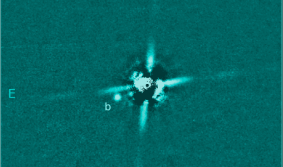The Keck Observatory helped Astronomers closely look into one of the youngest planets ever seen so far, confirming that it was actually an infant planet instead of a mere object from afar.

As per the latest report of CBS News, the planet is "a few times more massive" than the largest planet in the solar system, Jupiter.
The young planet, called 2M0437b, was first spotted by a research team spearheaded by the University of Hawaii last 2018, using the Subaru telescope.
However, during that time, astronomers are still uncertain about its latest discovery. It is still unclear if it is an actual planet or a remote object in the infant star.
Keck Observatory and Astronomer's Discovery of One of the Youngest Planets
As such, the scientist from Hawaii went on to observe it using the Keck Observatory, along with other telescopes, to confirm that it is one of the youngest planets ever discovered to date, according to the report of Engadget.
That said, the astronomers had to spend three years tracking the 2M0437b using the Keck Observatory in Maunakea until evidence showed that it is a real planet.
The confirmation took that long as the star, where the planet, was found moved very slowly across the sky.
Keck Observatory
Meanwhile, as per the website of the Keck Observatory, it houses the world's largest infrared and optical telescopes.
Its technology further helps astronomers not just to explore the local scientific discoveries. It also looks into distant objects across the Universe, as the recent discovery of one of the youngest planets.
One of the Youngest Planets: 2M0437b
The planet named 2M0437b is touted to be one of the youngest planets ever discovered as it is only several million years old since it was formed.
The scientists further noted that the age of the young planet is nearly the same time that the islands of Hawaii first emerged from the blue sea.
In fact, the said planet is still in its infancy stage, so its temperature is still extremely hot, which is likened to "the lava erupting from Kilauea Volcano."
What's more, it is worth noting that the young planet is difficult to observe due to its exceedingly far distance from Earth.
Hence, observing the said planet is almost impossible if not for the adaptive optic technology of the Keck Observatory.
Read Also : NASA Perseverance Discovers Mars' Jezero Crater to be a Lake, Hints to a Previously Warm Planet
Young Planet Discovery: What Now?
Engadget noted in the same report that such discoveries of infant planets help humankind further understand how planets form, which is still unknown to date.
Not to mention that being able to track and observe a planet of its young age could help scientists learn how planets develop over time.
Related Article : First Exoplanet To Survive Star's Death Might Offer an Idea What Would Happen To Earth if Sun Dies
This article is owned by Tech Times
Written by Teejay Boris




